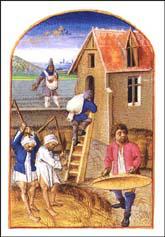Alfred the Great
Alfred, the fifth and youngest son of King Ethelwulf, was born in 849. At the age of four he was taken to Rome to be confirmed by Pope Leo IV.
In 871 he succeeded Ethelred I as king of England when Viking invaders were occupying the north and east of England and Wessex was under attack. In 878 the Danish army led by Guthrum forced Alfred into hiding in the marshes of Athelney in Somerset.
Alfred's counter-offensive produced a victory at Edington, Wiltshire, in 878. Under the terms of the Treaty of Wedmore, Guthrum agreed to withdraw to East Anglia. However, Alfred was forced to accept the Danes as rulers of East Anglia and much of Mercia.
Alfred repelled another invasion in 885 and the following year captured London. To combat further invasions, Alfred reorganized the fyrd, created a ring of fortified strongholds around his kingdom, and built a fleet to reinforce his defences. This gave him the reputation of being the father of the English Navy.
Alfred also promoted education and learning and encouraged the production of the Anglo-Saxon Chronicle. He personally translated Latin books into Anglo-Saxon; including the works of Gregory the Great, Bede and Orosius.
Alfred died in October, 899, and was buried in Winchester.

